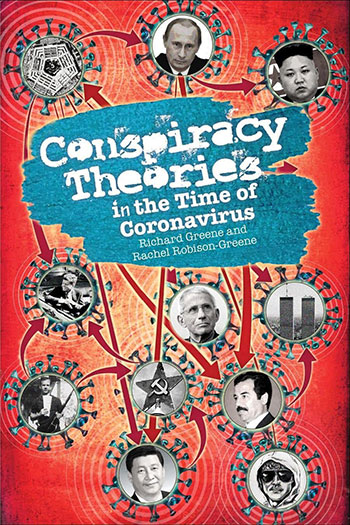WSU & USU professors examine popular conspiracy theories in new book
OGDEN, Utah – In a time when conspiracy theories have made their way into mainstream media in unprecedented amounts, two Utah professors are exploring the impact conspiracy theories have on society with their new book “Conspiracy Theories in the Time of Coronavirus: A Philosophical Treatment.”
Conspiracy theories meet at the intersection of the specialties of Weber State University philosophy professor Richard Greene and Utah State University philosophy professor Rachel Robison-Greene. The couple began writing “Conspiracy Theories in the Time of Coronavirus” before the 2020 presidential election, just as the conspiracy theory landscape began to change rapidly. Greene specializes in the best practices of belief formation and the study of epistemology - theories of knowledge, while Robison-Greene is an expert on ethics and moral psychology. Both also study pop culture and their publisher thought they were well suited to research the impact of conspiracy theories on society.
“Our account of what a conspiracy theory was didn’t change very much,” Richard Greene said. “However, all the social implications and the ways conspiracy theories spread and affected society changed quite a bit during the time of the election. We had to rethink a lot of our previous research.”
According to Richard and Rachel, conspiracy theories have almost always existed and will continue to exist, but harmful conspiracy theories being shared in unprecedented amounts on social media affects people’s health, lives and political leanings.
“The conspiracy theories surrounding the pandemic had significant real world implications,” Richard Greene said. “We're talking about people's lives here, and as we note in the book, conspiracy theories are being passed about in unprecedented ways and numbers — it’s a public health crisis really. So that’s why we wanted to focus on it in the book. We knew it was the case that everyone was being impacted by conspiracy theories related to the pandemic.”
Each chapter of the book begins with discussing different conspiracy theories that have been popular at various points throughout history such as birds not being real, the Illuminati and the assassination of President John F. Kennedy.
“So many conspiracy theories employ racsist and antisemitic motifs,” said Richard and Rachel. “We hope to help people avoid becoming susceptible to that mindset.”
Richard and Rachel also hope that readers get a clearer understanding of what conspiracy theories are and how they’ve been used over time. Though the book covers lighter and heavier material, it is written for all ages.
“I think conspiracy theories at their core are about people feeling marginalized and frustrated at power imbalances,” Rachel Robison-Greene said. “If we constructed social systems where people felt less marginalized and focused on societal inequalities, we could mitigate some of the harmful conspiracy theories we’re seeing now.”
“Conspiracy Theories in the Time of Coronavirus: A Philosophical Treatment” launches on June 14. It will be available globally at Target, Walmart, Amazon, Barnes and Noble and is currently available for Kindle download.
Visit weber.edu/wsutoday for more news about Weber State University.
-
Kennedy Jones, Marketing & Communications
801-626-7948, kennedyjones1@weber.edu
-
- Contact:
-
Richard Greene, philosophy professor
801-626-6694, rgreene@weber.eduRachel Robison-Greene, philosophy professor
rachel.robison@usu.edu
-